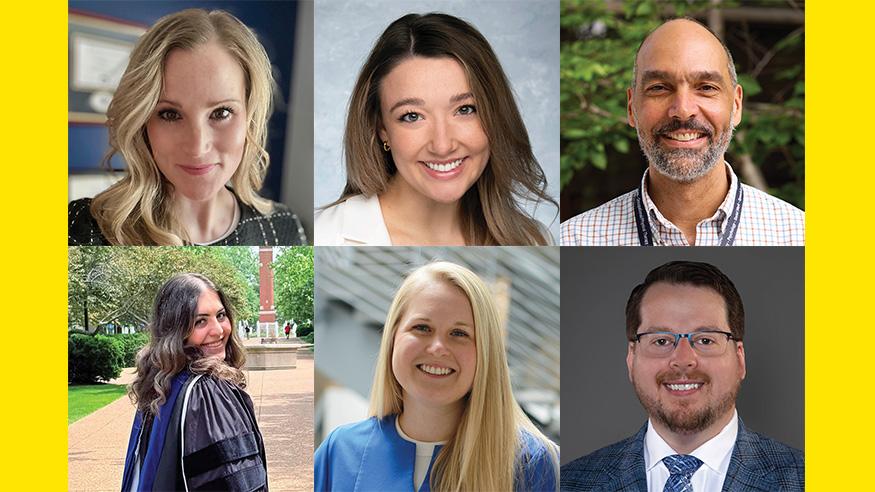
What is a thread that connects these alumni in different health care careers? In other words, what is Augie’s “secret sauce”? We asked. Clockwise from top left: Kristen Lauterbach ’08 Dola, Claire Rittenhouse ’20, Aben Cooper ’93, Christopher Carter ’13, Alyssa Anderson '13 and Natalie Hardy ’20
Discovering careers in health care – the Augie way
Data shows that Augustana does an outstanding job of preparing students for successful health care careers of all kinds — not just medical school. Public health, epidemiology, physical therapy, optometry, ethics, administration and more.
But why are they so successful? What is a thread that connects these alumni in health care? In other words, what is Augie’s “secret sauce”? We asked.
- Kristen Lauterbach ’08 Dola decided against medical school after a family tragedy. Now she’s a patent attorney in the biotechnology and pharmaceutical field who has been involved in defending the original CRISPR gene editing patents.
- Claire Rittenhouse ’20 was determined to major in biology and work in health care. That changed when she took her first public health class. Today, she is working on a five-year, $7 million project to reduce racial disparity in maternal care.
- Aben Cooper ’93 found engineering wasn’t for him and through advising discovered that physical therapy united his love of science and athletics. He has carried that team spirit into his work for Chicago Public Schools.
- Alyssa Anderson ’13 knew she wanted to be in health care but doing what? Through a job-shadow experience and internship with Augie connections, she found a passion for optometry. Today she is an optometrist at Virdi Eye Clinic in the Quad Cities.
- Natalie Hardy ’20 thought she would become a physician assistant but philosophy and ethics courses changed her mind. She now is an ethics and disability rights strategist for Advocate Health, the third-largest nonprofit, integrated health system in the United States.
- Christopher Carter ’13 always knew he wanted to work in health care, but never imagined becoming a health care executive. He didn’t even know such a role existed. Today he is vice president for operations and organizational performance at UW Health in Rockford, Ill.
Based on these alumni stories and many others, Augustana’s “secret sauce” seems to be a blend of ingredients: strong mentoring, alumni connections, ability to explore (and switch) fields of study, and the constant push to think critically and ask the tough questions.
Biotech/pharma law
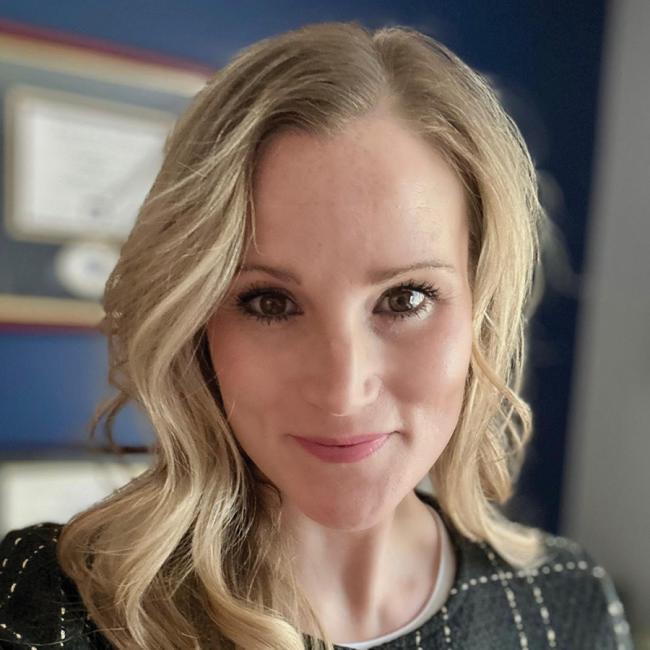
Kristen Lauterbach ’08 Dola graduated magna cum laude from Loyola University School of Law and has been working with biopharma patents since 2008.
While I was at Augustana, I knew I wanted to be in science but had no specific direction. Some great guidance from Bob Tallitsch and my advisor persuaded me that I was, in fact, smart enough to be a physician.
Unfortunately, my sophomore/junior year, my brother was diagnosed and passed away from bone cancer at age of 25. Being away from my family at the time was so hard and the thought of a career that would be constantly around death and dying felt like an insurmountable brick wall.
I spent a lot of time in Bob’s office — sometimes we talked, sometimes I just sat and ate M&Ms. He convinced me I was good enough to do whatever I wanted and that it really didn’t matter if I was pre-med and opted not to go on to medical school.
So that’s what I did. I started job searching and found that really the only thing you could do with a general biology degree was work in a lab. But then a job posting for an Intellectual property biotechnology paralegal popped up. Patent law. Never once had law crossed my mind as an option for a science person.
I applied for and accepted the position and started working right after graduation. Sometime later and in view of my hard science degree, I was able to sit for the Patent Bar to be recognized as a patent agent by the United States Patent and Trademark Office.
A few years later, one of the partners at my firm was leaving to start her own firm, and she wanted to take me with her. It was at this point law school came into view.
Today I am a patent attorney working exclusively in the biotechnology/pharmaceutical field. I’ve worked on a few FDA-approved drugs and even have a hand in defending the original CRISPR gene editing patents.
And the best part is I use my degree and learn something new every single day. If you would have told 17-year-old Kristen sitting in Bob’s office eating M&Ms that this is where I’d end up, I would never have imagined it possible.
Epidemiology
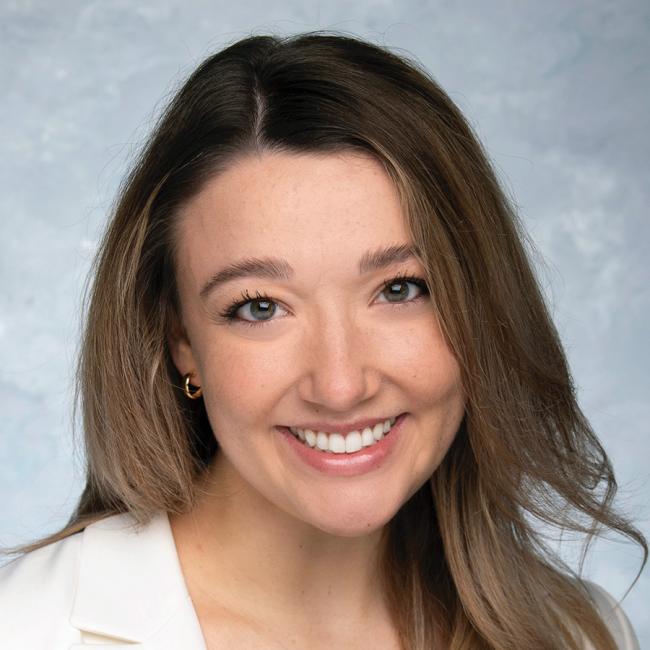
Claire Rittenhouse ’20 is an associate researcher at the University of Illinois Chicago.
When I first got to Augie, I was determined to major in biology. I wasn’t entirely sure what I would do with the major, but I knew I wanted to work in health care.
That intention shifted sophomore year when I took my first public health class. After every class, I’d walk from Old Main to the library and call my mom — who had encouraged me to take the course — to tell her everything I had learned.
Then I took PUBH-300 Epidemiology, and that’s where my love for public health sharpened into a mission. We were assigned to analyze an article on the morbidity and mortality disparities facing Black birthing patients, and I learned that Black patients are three to four times more likely to die a pregnancy-related death.
I needed to know why, and I needed to be part of the solution. That need led me to graduate school at the University of Iowa’s College of Public Health.
Today, I work on a five-year, $7 million research project statewide that addresses the fact that Black patients experience significantly higher rates of severe maternal morbidity nationally, but specifically in Illinois. Our team aims to reduce that disparity through quality improvement efforts with labor and delivery units across the state.
I love my job and the mission it serves, and I have Augustana’s “secret sauce” to thank: incredible professors and the transformative education they provide.
The main thing that carries me through my work now is the value of digging deep, which is something I learned from my professors at Augustana. Whether it was monopolizing Dr. Rebecca Heick’s office hours, posing endless questions to Dr. Lena Hann in the many classes I took with her or asking Dr. Scott Gehler for book recommendation after book recommendation, my professors never responded with frustration, impatience or dismissal.
Instead, they consistently modeled what it means to truly wrestle with complex ideas and encouraged me to do the same. That approach — of not settling for surface-level understanding — is something I carry into my work every day.
And that instinct to keep learning, to never assume I know enough … that all started with my professors who taught me that the hard questions are always worth asking.
Patient care – Physical therapy
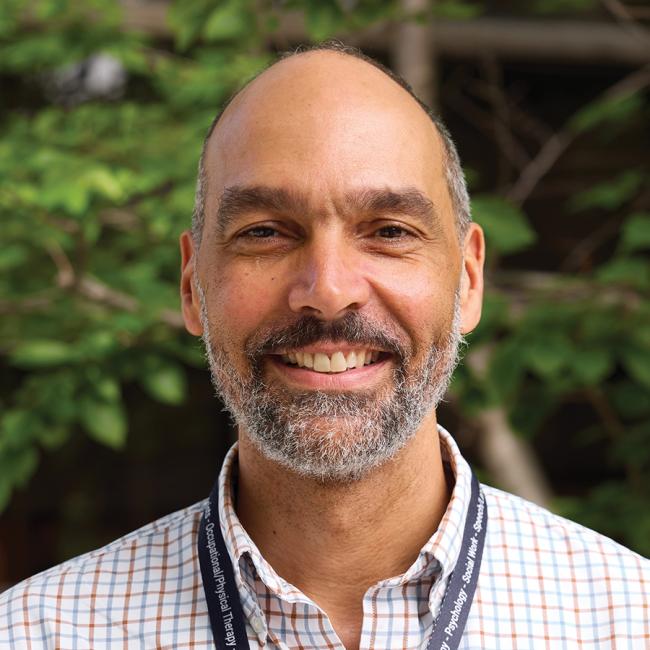
Aben Cooper ’93 earned a master’s in physical therapy from Northwestern University and an MBA from the University of Illinois Chicago.
When I started at Augustana, I planned to major in engineering but after a couple semesters of the high-level math and physics classes, I knew that engineering was not going to be in my wheelhouse, and I needed to change my plans.
Being at a small school allowed this change to happen without too much difficulty. I was guided to my career decision by Dr. Bob Tallitsch. We talked about the possibility of becoming a dentist or a medical doctor, an occupational therapist or a physical therapist. Looking at all the options, I thought that physical therapy was most in line with my interests and so that’s how I started on my career path, moving from engineering into a biology pre-physical therapy major.
From there I took off.
I believe the small school size allowed this change in career focus to happen seamlessly.
I think playing on the basketball team at Augustana helped me considerably in becoming a quality physical therapist. First, it connected my classwork to the sport that I loved. There was a deep-rooted interest in learning about how our bodies worked and recovered from injury.
In addition, being on a competitive athletic team also helped me appreciate working with people as a team. In the medical field we do this on a daily basis. Physical therapists aren’t doing things in a silo. To do our jobs well, we need input from our co-workers. Collaboration is essential in the medical field just as it is on our sports team, and I think that lesson was deeply ingrained through practice and competition.
I believe playing on the basketball team and taking classes in biology, anatomy and human physiology was a great mix. The intense exercise helped me internalize the coursework, making the learning very personal.
I take pride in the fact that Augustana has such a high percentage of students who are able to pursue their passion in sports, while working towards careers in the medical field that they will love for a lifetime.
Patient care – Optometry
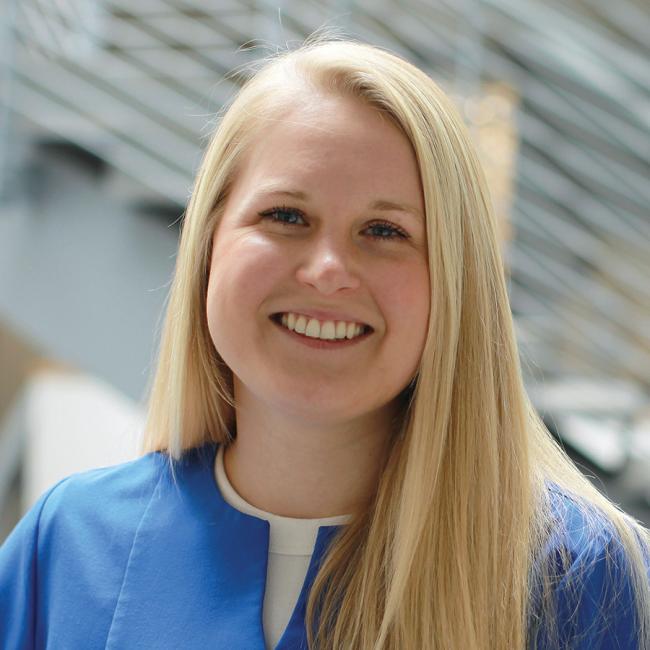
Alyssa Anderson ’13 earned her Doctor of Optometry at the Pennsylvania College of Optometry in Philadelphia.
When I started Augustana, I really thought I wanted to be a pediatrician. However, going into senior year, I became unsure if that was the right career path for me. My advisor, Dara Wegman-Geedey, helped me explore other health care professions to see what I might enjoy instead.
I job shadowed Dr. Zack Bartels ’98, who was a local optometrist and actually my optometrist growing up. After shadowing, I fell in love with optometry and the ability to help give sight to patients of all ages. It sparked my interest in following that career path versus going to medical school, so Dara then set me up with an internship at Virdi Eye Clinic with Dr. Stacie Setchell ’04. This internship confirmed optometry was definitely for me!
Being at the end of my senior year, it was too late to get into optometry school for the fall. Thankfully, yet another Augie alum, Virdi’s general manager Jessey Hullon ’81, offered me a job in medical records at Virdi Eye Clinic. I worked for a year learning as much as I could regarding how a fast-paced ophthalmology clinic operates, memorized ocular terminology and mastered speed typing, which has come in handy every day doing my charts!
There is such a strong Augie network, and we’re all so willing to help each other out. Having connections near campus really grew my passion for optometry and led to my career. I even completed a clinical rotation in Minnesota with Augie alum Dr. Zac Holland ‘10 during my fourth year of optometry school.
Critical thinking skills learned at Augustana and the ability to ask questions are key factors for discovering the root cause of my patient’s eye conditions and offering quality care.
The profession of optometry has expanded a lot since I graduated. I most recently have become a dry eye specialist offering intense pulsed light therapy and radio frequency to treat inflammation and meibomian gland dysfunction.
In my seven years of practice, I’ve had seven interns from Augie, and I’m taking another one soon. Being able to provide the same internship opportunity I had is really special. Every day I love looking at eyes and talking with my patients, and having the opportunity to teach interns as well. I am grateful to be able to serve my community, and I have Augie to thank for helping me find a career I am truly passionate about!
Ethics
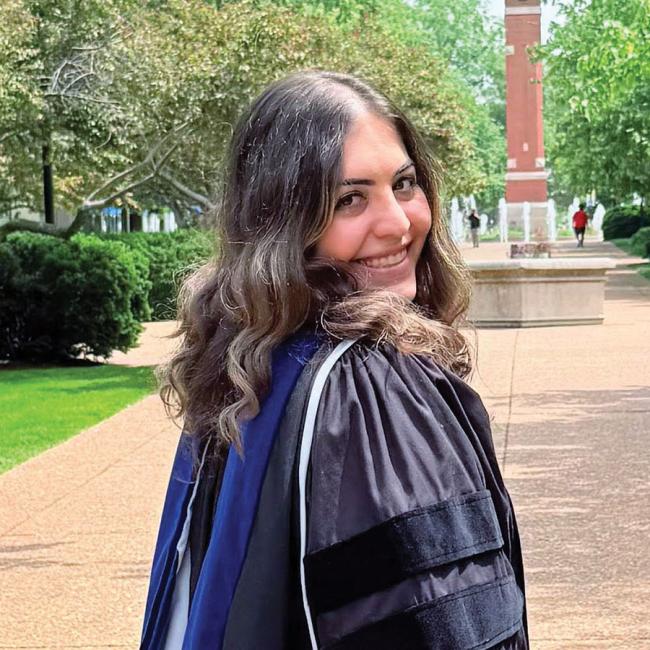
Natalie Hardy ’20 earned her Ph.D. in health care ethics from Saint Louis University in May 2025.
I started off thinking I was actually going to become a physician assistant, but then, because of the curriculum and the philosophy and ethics courses I was in, I totally changed my mind.
Taking a required philosophy course sparked an interest in something that I never thought I would like. The professors saw the potential in me and helped me understand how to make a career out of something that was my passion. Something a little bit more uncharted than becoming a PA.
Dr Heidi Storl is the reason I’m here now. She was the person I went to when I wasn’t sure how to make a career out of this, but I knew I loved it.
If I’d never taken philosophy that first or second year. I don’t think I would be here.
They (Advocate Health) heard about my dissertation and my Ph.D. And then, they created a job around them, which is really cool. My dissertation was about disability and accessibility, and the assumptions and ideologies that go into how we create space — the ethics behind space-making.
My official title is senior ethics and disability rights strategist. Half of my role is doing organizational ethics. And the other half is disability rights, and it’s there that I’m working to help build a comprehensive disability and accessibility program at Advocate.
I think my education in Augustana helped me cultivate a mindset that’s holistic, that isn’t just focused on one thing. And also one that thinks critically about social and ethical issues. So never taking things at face value, but thinking through what they really mean and what they mean for different groups of people.
Augie definitely changed my life. I say it all the time, but I don’t know that I would have found this career and even gone to graduate school were it not for the individualized attention I got there. You can talk with your professor — and not just a TA — about these big-picture issues.
If you don’t have that sort of open dialogue, how do you even know if you can do a career in something that not a lot of people do?
Administration
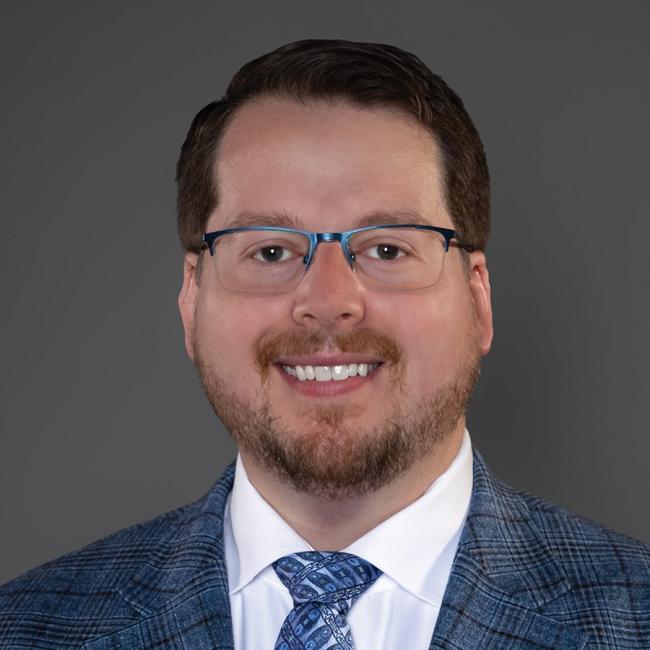
Christopher Carter earned a master’s in health administration from the University of Iowa and a master of arts in philosophy-bioethics from Indiana University.
I always knew I wanted to work in health care, but I never imagined becoming a health care executive — I didn’t even know such a role existed. I started college intending to become a scientist or physician, but the diversity of coursework at Augustana opened my eyes to new possibilities.
One pivotal moment was taking a combined neuroscience and ethics course led by Dr. Storl (philosophy) and Dr. Harrington (neuroscience). That class introduced me to bioethics and a range of health care roles I hadn’t considered before. I deepened that interest through Augustana’s Texas Medical Center Research Internship program in bioethics.
After graduation, I pursued a master’s in bioethics/ philosophy, a field I found deeply rewarding, I was exposed to health care administration and realized I could have a greater impact by pairing my background in bioethics with leadership in health care.
My career and educational journey have been far from linear, and every workday brings new challenges that require thoughtful, often unconventional, solutions. What has carried through most strongly from Augustana is the mindset I developed there — critical thinking, curiosity and a comfort with exploration.
While the academic curriculum was fundamental, it was the broader learning environment that truly shaped me. At Augustana, I found my voice and developed the problem-solving framework I use every day.
